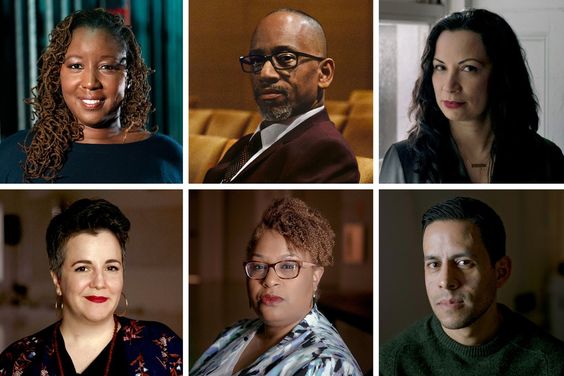New artistic directors, clockwise from top left: Nataki Garrett, Robert Barry Fleming, Stephanie Ybarra, Jacob G. Padrón, Hana Sharif and Maria Manuela Goyanes.
Photo Credits Clockwise from top left: Jessica Kourkounis for The New York Times; Andrew Spear for The New York Times; Gabriella Demczuk for The New York Times
By Michael Paulson
To understand the striking transformation taking place in the American theater, consider Nataki Garrett.
Ms. Garrett, a stage director who has held leadership posts in California and Colorado, is an African-American woman with a track record of championing new work. On Tuesday, she is being named the sixth artistic director of the Oregon Shakespeare Festival, a Tony-winning nonprofit with a $44 million budget and an annual audience of 400,000.
Across the country, scores of artistic directors, most of them white men who have served as community tastemakers for years, are leaving their jobs via retirements, ousters, and an industrywide round of musical chairs. As their successors are appointed, a shift is underway: according to a national survey conducted by two Bay Area directors, women have been named to 41 percent of the 85 jobs filled since 2015, and people of color have been named to 26 percent.
Last week, the Actors Theater of Louisville, home to the career-making Humana Festival of New American Plays, named Robert Barry Fleming, an African-American performer and producer, as its next artistic director.
His appointment followed last year’s naming of Jacob G. Padrón at Long Wharf Theater in New Haven; Stephanie Ybarra at Baltimore Center Stage; Hana Sharif at the Repertory Theater of St. Louis, and Maria Manuela Goyanes at Woolly Mammoth Theater Company in Washington. Mr. Padrón, Ms. Ybarra and Ms. Goyanes identify as Latinx, which is a genderless term for people with roots in Latin America; Ms. Sharif is African-American.
“When I was coming up, there were very few women in leadership positions, and very few women of color,” Ms. Garrett said. “The tide has to move for the future of the theater in America.”
Artistic directors — as the title suggests — are in charge of the creative side of theaters, choosing and overseeing shows, directors and the artistic staff, but they also are generally the public representatives of the organizations, and share in responsibilities for fund-raising, communications, and audience development.
Mr. Padrón, Ms. Ybarra, Ms. Sharif and Ms. Goyanes discussed issues of representation at a meeting at Baltimore Center Stage, which Ms. Ybarra now leads.CreditGabriella Demczuk for The New York Times
Image
Mr. Padrón, Ms. Ybarra, Ms. Sharif and Ms. Goyanes discussed issues of representation at a meeting at Baltimore Center Stage, which Ms. Ybarra now leads.CreditGabriella Demczuk for The New York Times
The new guard faces many challenges — balancing change and continuity, luring new audiences without alienating current patrons, as well as the financial issues that bedevil all nonprofit arts institutions.
Their presence promises to affect what audiences see at the noncommercial spaces that for decades have been the lifeblood of stage work outside New York.
“My first season will follow a season with eight white male playwrights,” Ms. Sharif said. “They’re interesting plays. But my season will feel different.” And it does: among her choices are a musical about the South African singer Miriam Makeba and a version of “Medea” set among immigrants in Los Angeles. (“Angels in America” and the Broadway comedy “The Lifespan of a Fact” are on the roster, too.)
The two San Francisco Bay Area-based theater directors, Rebecca Novick and Evren Odcikin, who conducted the survey of turnover at American theaters began their project after observing online outrage when some key openings were filled with white men.
Their data confirms that a major leadership transition is underway in a historically stable field. More than one-third of the 75 members of the League of Resident Theaters, which includes many of the nation’s biggest and most prominent nonprofits, have named new artistic directors in the last four years.
But demographic change is uneven. “The bigger the theater, the less likely the board is to hire a woman, and especially a woman of color,” Ms. Novick said.
Many of the new artistic directors are taking charge of organizations that are more mature — longer histories, bigger staffs, established reputations — than those assumed by their predecessors.
Ms. Goyanes, center, mingling at her first gala for donors after taking over as the artistic director of Woolly Mammoth Theater Company.CreditJustin T. Gellerson for The New York Times
Image
Ms. Goyanes, center, mingling at her first gala for donors after taking over as the artistic director of Woolly Mammoth Theater Company.CreditJustin T. Gellerson for The New York Times
They come to their posts with different training as well. No longer are they all stage directors; a conspicuous subset rose through the ranks as administrators and producers.
Among those soon to retire are Bruce E. Millan, who has been artistic director of Detroit Repertory Theater for 62 years, and Robert Kelley, who has held that position at TheatreWorks Silicon Valley for 49 years.
But a handful of those departing are going unwillingly, pushed out over allegations of sexual misconduct and problematic workplace behavior.
Mr. Padrón succeeds Gordon Edelstein, fired after accusations of misconduct, while in Canada, Weyni Mengesha, a daughter of Ethiopian immigrants, in October was named artistic director of Soulpepper, Toronto’s largest nonprofit theater, after Albert Schultz left over harassment allegations.
Change is especially pronounced in the Bay Area. Mr. Kelley’s retirement next year will follow departures of longtime leaders of the American Conservatory Theater in San Francisco, where Carey Perloff, retiring after 25 years as artistic director, was succeeded by Pam MacKinnon; and in Berkeley, where Johanna Pfaelzer this fall will replace Tony Taccone, who is retiring after 22 years as artistic director.
New York City, by contrast, has been far slower to change. The four nonprofits that operate Broadway theaters have all had the same artistic leadership for years: Lynne Meadow has been the artistic director of the Manhattan Theater Club since 1972; Carole Rothman at Second Stage since 1979; Todd Haimes at Roundabout Theater Company since 1990; and André Bishop at Lincoln Center Theater since 1992.
Theater leadership is still not broadly reflective of the nation’s demographics. “White men still have a big piece of the pie, so whatever you do, please do not intimate that suddenly there’s such a sea change that women or people of color have the bigger piece,” Ms. Goyanes said. “It is just not true.”
The Woolly Mammoth gala included a dance performance which Ms. Goyanes, rear left, watched with enthusiasm.CreditJustin T. Gellerson for The New York Times
Image
The Woolly Mammoth gala included a dance performance which Ms. Goyanes, rear left, watched with enthusiasm.CreditJustin T. Gellerson for The New York Times
A Spanish-Dominican-American whose father was a Queens bus mechanic, Ms. Goyanes was born the same year that Woolly Mammoth held its first season in the nation’s capital. Now she is running the place, succeeding Howard Shalwitz, who was in charge for all of the nearly four decades that began when he and a fellow actor sketched out their dreams with a “founding manifesto.”
One day last fall, as she prepared to preside over her first gala and greet donors, Ms. Goyanes, who came to Woolly Mammoth from New York’s Public Theater, was also still helping her staff learn to pronounce her last name. She asked for advice on how to stop her hands from moving as she talked — would it look O.K. if she clutched the lectern? — and tested out a punchy speech that referred to the newest Supreme Court justice as “an accused sexual predator.”
She insisted that the evening open with an acknowledgment of the Native Americans who once lived on the land where her theater now sits. “If we say we’re going to be radically inclusive,” she said, “we’d better be radically inclusive.”
In explaining her goals, she pledged that Woolly Mammoth would respond to the issues of the day. “People are being dehumanized, people of color are being killed every day, our kids in the schools are experiencing mass shootings,” she said. “Artists have the ability to create transformative experiences for people so it jostles them and jolts them awake.”
A few weeks later, Ms. Goyanes met with Ms. Ybarra, Mr. Padrón and Ms. Sharif at Baltimore Center Stage, where they compared notes and talked about how they might help one another succeed as what Ms. Ybarra called “people of color walking into predominantly white institutions.”
Around the conference room wall they had posted large sheets of paper with the letter X through phrases like “savage individualism,” “scarcity mentality” and “oppressive practices and systems.” Their preferred alternatives: “coalition building,” “abundance mentality,” “inclusive practices.”
They talked about battling preconceived notions — that they see as false — that Americans of color are not interested in, or can’t afford, theatergoing — but also acknowledged the need to make theaters feel more welcoming, and even fun, for audiences new to the art form.
They noted that some earlier artistic directors of color had felt isolated in the industry, and vowed to keep each other on speed dial. “When I’m at the end of whatever time I have here,” Ms. Ybarra said, “all I want behind me is a trail of open doors and shattered glass.”









